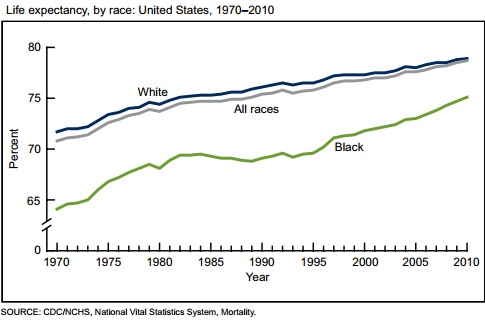
|
|

|
|
| April 19, 2024 |
|
Homicide 'directly affecting' racial gap in U.S. life expectancy, study shows 
Americans are now living longer than years prior, with a life expectancy of 78.7 years, according to a new report from the Centers for Disease Control and Prevention. But overall, African-American males continue to die younger, with heart disease and homicide shortening their lives.
White females have the longest life expectancy at 81.3 years, black females at 78 years, white males at 76.5 years and black males have the shortest at 71.8 years. The report, released Thursday, highlights the causes of death that affect the differences in life expectancy between blacks and whites, namely, heart disease, cancer, homicide and diabetes. “We expected heart disease and cancer, those are still the main focus, but what’s interesting is when you look at the graph for males, you see how important homicide is for directly affecting life expectancy for African-Americans,” says Kenneth D. Kochanek, lead author of the report and statistician with the CDC’s National Center for Health Statistics. For black males, homicide decreased life expectancy by almost a year. Heart disease was the most significant cause of death affecting the disparity in life expectancy, but for black males, homicide was number two, ahead of cancer and stroke. “We have to look at [violence and homicide] like a disease,” says Dr. Robert Gore, emergency medical physician at Kings County-SUNY Downstate Hospitals and executive director of KAVI, the Kings Against Violence Initiative in Brooklyn. “There are over 700,000 reported violent acts per year involving U.S. youth presenting to our hospitals. We have to stop looking at violence as a purely social problem.” The majority of homicides involve youth and young adults between the ages of 10 and 24. In fact, it’s the number one cause of death among black males in this age group. And despite making up just 13 percent of the population, the FBI reports that half of the homicide victims in 2011 were black. But now, this new CDC data illustrates just how striking those numbers are, dramatic enough to affect the overall life expectancy for all black men, across all ages. Even more reason, Gore says, that the medical community needs to intervene. “When we in the medical community started looking at motor vehicle accident deaths and looked at the factors that contributed to death, speeding, low car safety standards, not wearing seatbelts, driving while intoxicated, changes were made to legislation to enforce driving with seatbelts, lower the speed limit, and encourage sober driving, and the number of MVA deaths decreased. “The same needs to happen with violence and homicide,” Gore adds. While it is known that conditions such as heart attacks, stroke, diabetes and high blood pressure are affected by low socioeconomic status, the same is true for the incidence of violence and crime, including homicide. In fact, poverty in general, especially in African-American communities, is associated with shorter life expectancy. “Until there is a difference in levels of poverty, especially as it relates to limited health services to this particularly vulnerable population, then there will be no major changes in life expectancy for black men,” Gore explains. Kochanek and his team hope this data will be used as a catalyst for public policy change and for public health experts to further investigate the issues. The report also showed that suicide, unintentional accidents, Alzheimer’s disease, liver disease and chronic lung diseases had the opposite effect, and were associated with a longer life expectancy as compared to whites. (Source: NBC News) Story Date: July 19, 2013
|